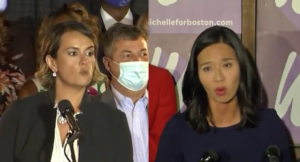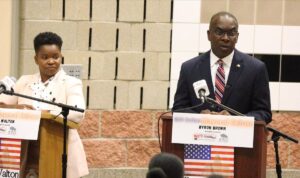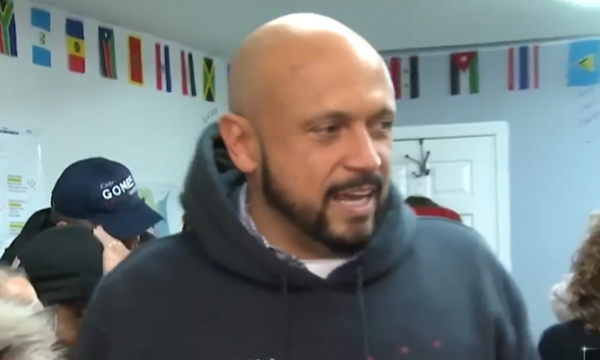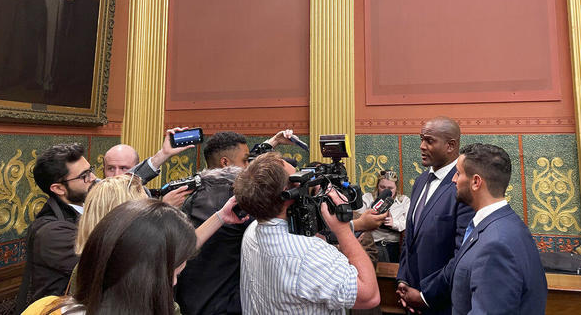Off-year elections present unusual scenarios
U.S. elections in odd-numbered years rarely generate a lot of excitement, but several out-of-the-ordinary contests will come to a climax next week.
Gubernatorial contests in Virginia and New Jersey
When Virginia voters go to the polls on Tuesday, who will they prefer: 45 or 46? Democrat Terry McAuliffe has held the office before, so one might think this race would be decided on his track record. But Virginia is now the purplest of swing states, and Democrats are going all-out to make this race a popularity contest between Presidents Trump and Biden.

McAuliffe and Youngkin
Republican candidate Glenn Youngkin wants none of that – he’s happy that the nation’s 45th president has kept his distance so far – but the torrent of outside money pouring into the race makes clear that big-money interests regard it as a worthy national battleground. McAuliffe still holds a slight edge in the polls, but this race will be decided by turnout. Can appeals from Biden and former president Barack Obama inspire enough Democrats to participate in an off-year race? Stay tuned.
Down-ballot, two black women are competing for lieutenant governor: Democratic Del. Hala Ayala and Republican former delegate Winsome Sears. Whoever wins will be the first African-American woman elected to statewide office in the state’s history.
Meanwhile in New Jersey, this year’s contest between Democratic incumbent Gov. Phil Murphy and Republican Assemblymember Jack Ciattarelli was also tightening, for a while at least, at a time when the logjam in Washington has caused President Biden’s approval rating to drop off. A later poll, however, shows Murphy again holding a double-digit lead in that race.
Seattle
Both of the candidates in Seattle’s mayoral election are left-of-center, which comes as no surprise. This year former city council president Bruce Harrell faces off against the current council president, Lorena Gonzalez, who seems to be succeeding in grabbing the mantle of most-progressive candidate. But is this a winning strategy? Don’t candidates usually compete for the middle in general elections?

Davison and Thomas-Kennedy
And a nonpartisan down-ballot contest has the potential to tip the balance in the mayor’s race. The current city attorney, Pete Holmes, finished third in the preliminary election this year, knocking him out of contention. But the two top finishers, who face off against each other Tuesday, both carry significant political baggage. Last year, former public defender Nicole Thomas-Kennedy expressed “rabid hatred” for police and even advocated for secession and violence in a series of inflammatory and often unprintable tweets. But her opponent, attorney Ann Davison, committed what may prove a greater sin: she changed parties last year, becoming a Republican even as many Republican moderates were abandoning President Trump. Davison says she ultimately did not vote for Trump, but her party switch has Washington state’s Democratic opinion-leaders holding their noses even as many endorse her candidacy.
Boston
Boston will make history next week when it elects its first woman mayor. Both Michelle Wu and Annissa Essaibi George are city councilors, and both identify as persons of color. (Though raised Catholic, Essaibi George’s father was a Tunisian Muslim.) Wu topped the ticket in the preliminary and continues to enjoy a lead in recent polls, although pollsters typically struggle to predict turnout in municipal-only elections.

Essaibi George and Wu
While the two candidates agree on many positions, Essaibi George is viewed as more conservative than Wu. Trade, teacher and law enforcement unions have turned out heavily for Essaibi George, and her base largely aligns with that of popular former mayor Marty Walsh, whom President Biden tapped to serve as labor secretary.
Essaibi George has pretty much locked up the conservative white vote in Boston, but that once-dominant demographic has long been in decline. A key deciding factor in this race will likely be Boston’s black community, which was stung when both African-American candidates were eliminated in September’s preliminary election.
Buffalo
Like Boston, Buffalo, New York is a reliably Democratic city. But four-term mayor Byron Brown, who lost the primary in his bid for re-election, is not going gently into the night. Instead, he is mounting a write-in campaign, after failing to place his name on the ballot as an independent or as the candidate of his newly-formed “Buffalo Party.”

Walton and Brown
Brown’s challenger, India Walton, is a nurse and longtime prison-reform activist who identifies as a Democratic Socialist and was active in last year’s widespread protests after the killing of George Floyd in Minneapolis. She has pledged to reduce the police department budget by $7.5 million and to replace police officers in some instances with mental health workers and civilian employees.
Despite winning the Democratic nomination, Walton has not won the endorsement of many prominent statewide Democrats, including Gov. Kathy Hochul, Attorney General Tish James, and New York Democratic Chair Jay Jacobs.
Other mayoral contests
In other mayoral races, Brooklyn Borough President Eric Adams is expected to be the next mayor of New York City, where Democrats hold a 7-1 voter-registration advantage.

Frey and Nezhad
Public safety is largely the focus in some other major cities. In Atlanta former mayor Kasim Reed wants to hire more police to address a nearly 60 percent rise in violent crime, while in Minneapolis, Sheila Nezhad, one of the major organizers of last summer’s protests after the killing of George Floyd, wants to replace the city’s police department with a new, gentler “department of public safety.” Mayor Jacob Frey, who is seeking re-election, does not support this proposal.
Virginia House of Delegates
Many states are now redrawing legislative districts with an eye to the 2022 elections. The trend this year is decidedly more partisan, as in most states the party in power, whether Republican or Democrat, is using redistricting to consolidate and strengthen its hold in legislative and congressional races.
In New York, this contest is reflected in a ballot question, Proposal 1, which would give the Democratic legislative majority more power in crafting district boundaries.
Virginia and New Jersey, however, are already electing their next crop of legislators. Here the chamber to watch is Virginia’s House of Delegates, its lower house. Democrats currently hold a 55-45 margin, but could easily lose six seats in the shadow of this year’s tight and heavily promoted gubernatorial race.
Democrats will continue to enjoy a 21-19 majority in the Senate in 2022, even if they lose the House. Virginia’s senators do not face re-election until 2023.
Both chambers in New Jersey are up for re-election this year, but Democrats go into Tuesday’s election with a 25-14 edge in the Senate and a 52-28 grip on the General Assembly, the state’s lower house.


